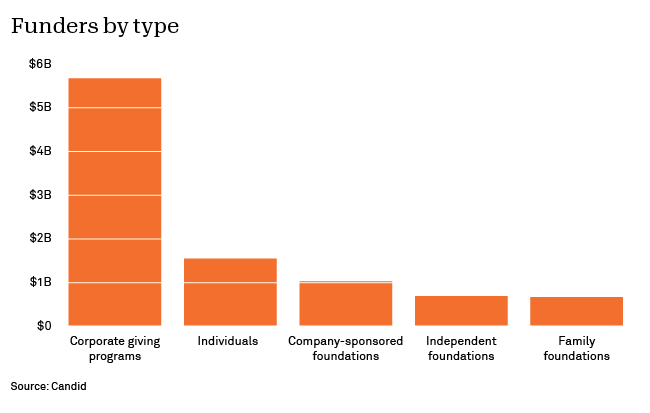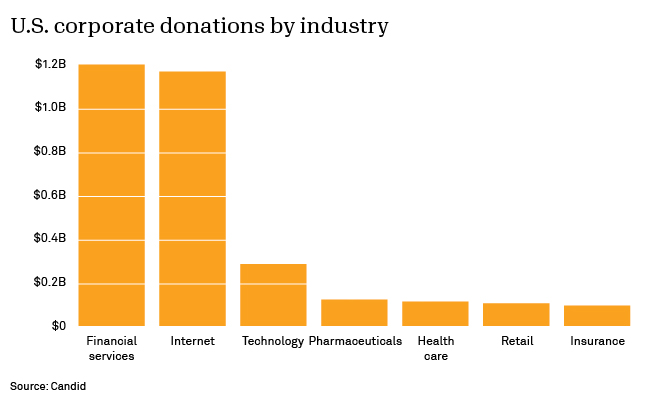Philanthropy’s response to COVID-19 now more than $10 billion worldwide

Philanthropy’s response to the COVID-19 pandemic has surpassed $10 billion (USD). To put this unprecedented commitment of institutional and individual philanthropy in perspective, the U.S. total alone of more than $6 billion is, according to Candid’s figures, more than double the entire campaigns for 9/11, the 2008 financial crisis, Hurricane Harvey, the Ebola outbreak, the Haitian earthquake, and the recent Australian bushfires.
As of April 21, 2020, according to the Kaiser Family Foundation, total outlays by donor governments (not including domestic economic stimulus and recovery efforts) and multilateral organizations in support of COVID-19 relief was $16.5 billion. That means that philanthropy’s $10 billion commitment is a staggering 38 percent of all $26.5 billion in COVID-19 relief funding through the end of April. Not all commitments are cash gifts; Candid has identified $1.6 billion of in-kind COVID-19 gifts globally, which account for 16 percent of total giving.
Overview of the findings
- The United States and China continue to be the largest sources of COVID-19 philanthropy. India, however, has surpassed Italy as the third-largest geographic source.
- Jack Dorsey and Google remain the largest funders, accounting for one-third of U.S. and one-fifth of global COVID-19 giving.
- Corporate giving makes up the lion’s share—65 percent—of contributions.
- The three top named recipients globally are—not counting Jack Dorsey’s Start Small LLC—ByteDance, which established three global COVID-19 relief funds totaling $250 million through TikTok, its wholly owned subsidiary; the COVID-19 Therapeutics Accelerator, established by the Bill & Melinda Gates Foundation, which has so far received $175 million in contributions; and Feeding America, which has received $115 million to date.
- Candid has identified 639 COVID-19-related funds established by 594 foundations. Many of those funds, 67 percent of which are hosted by community foundations, have already made several rounds of disbursements. The first $83 million in disbursements has focused on health, human services, public safety, education, and community and economic development.
- Numerous sources report the pandemic is disproportionately affecting minority communities. Candid’s data, however, indicates that only 0.1 percent of COVID-19 funding and only 2.2 percent of grants indicate an explicit focus on minority populations.
Details about sources of COVID-19 philanthropy
Giving by country
Candid’s latest COVID-19 funding figures by country present a more complete, though still evolving, picture of global commitments. The United States and China still account for 94 percent of all identified pledges and 76 percent of the global dollar amount. The Oppenheimer family powered donations in South Africa, the Tata Trust and Company did the same in India, and the royal family catalyzed relief efforts in Morocco.
Below are funding totals for all countries with commitments constituting at least 1 percent of the total:
| Country | Amount | |
|---|---|---|
| United States | $6,168,487,212 | |
| China | $1,321,211,961 | |
| India | $498,554,202 | |
| Brazil | $459,038,459 | |
| United Kingdom | $356,689,057 | |
| South Africa | $306,796,748 | |
| Italy | $298,695,499 | |
| Morocco | $208,797,189 | |
| Australia | $128,130,770 | |
| Japan | $105,912,200 | |
| Greece | $100,000,000 | |
| Spain | $66,090,650 | |
| Denmark | $57,377,250 |
Top funders globally
Donations by the top 20 global funders constitute 52 percent of the total dollar value of all contributions, with Jack Dorsey and Google alone accounting for one-third of U.S. and one-fifth of global commitments. Start Small LLC, Mr. Dorsey’s vehicle for the distribution of his $1 billion commitment, has so far disbursed a little more than $12 million, while the value of his equity endowment has grown to more than $1.2 billion. The Bill and Melinda Gates Foundation, whose $100 million commitment got the ball rolling in the U.S. back on February 5, has since increased its commitment to $305 million. U.S. funders occupy 6 of the top 10 and 10 of the top 20 positions by dollar amount. The list below shows all funders with commitments of at least $110 million.
| Funder | Country | Amount | ||
|---|---|---|---|---|
| Jack Dorsey | United States | $1,000,000,000 | ||
| United States | $907,750,000 | |||
| ByteDance | China | $426,840,000 | ||
| Bill & Melinda Gates Foundation | United States | $305,000,000 | ||
| Mastercard | United States | $275,300,000 | ||
| Itau Unibanco Holding S.A. | Brazil | $239,826,923 | ||
| Cisco Systems | United States | $218,000,000 | ||
| Visa Foundation | United States | $210,000,000 | ||
| Tata Trusts | India | $199,097,425 | ||
| Royal Holding Al Mada | Morocco | $197,912,028 | ||
| Wells Fargo Foundation | United States | $181,250,000 | ||
| Tencent Holdings | China | $173,040,000 | ||
| Alibaba Group | China | $144,200,000 | ||
| Azim Premji Foundation | India | $130,562,100 | ||
| Open Society Foundations | United States | $130,000,000 | ||
| The Barclays Foundation | United Kingdom | $125,800,000 | ||
| Facebook, Inc. | United States | $122,025,000 | ||
| China Evergrande Group | China | $115,000,000 | ||
| Bank of America Corporation | United States | $111,500,000 | ||
| Assicurazioni Generali S.p.A. | Italy | $110,093,500 | ||
| Intesa Sanpaolo S.p.A. | Italy | $110,093,500 |
Giving by funder type
The disposition of dollars by funder type remains essentially the same as Candid’s last analysis more than two weeks ago. Companies and their foundations account for 65 percent of the dollar value of commitments worldwide, whereas individual donations, powered by huge commitments by Jack Dorsey, Jeff Bezos, and Reed Hastings and Patty Quillin account for another 15 percent. Donations by independent and family foundations constitute 12 percent of the total, with public charities, operating foundations, limited liability companies, and community foundations accounting for the remaining 8 percent. The bar graph below compares the contributions of funder types constituting at least 5 percent of the total dollar value of contributions:

U.S. corporate giving by industry
U.S. companies and their foundations have contributed more than $3.5 billion toward COVID-19 relief so far. In the last two weeks, corporate giving has returned to more familiar patterns, with companies such as Citigroup, Mastercard, Goldman Sachs, Chubb, and BNP Paribas USA powering a flip with Internet companies, which had more than double the dollar value of commitments of financial services companies last month. Even if financial services companies retain their traditional position as the most generous industrial sector, one of the more interesting stories of the COVID-19 response in the U.S. so far is how Internet, technology, semiconductor, and computer hardware and software companies have become forces to be reckoned with philanthropically. The bar graph below compares the contributions of U.S. industries constituting at least 2 percent of the total dollar value of contributions:

This analysis is happening in real time, as is the giving it’s based upon. Data is collected from publicly available sources, including press releases, websites, membership reports and surveys, and local reporting. We wonder: how do real-time analyses inform and shape the response that follows? As a nonprofit ourselves, we at Candid are navigating new landscapes for giving, and thinking deeply about the real—often sobering—implications of funding patterns for a wide range of organizations. We’ll keep sharing what we know, in hopes that givers can use the data to inform their thinking.
Editorial note: Candid offers the following resources for responding to and coping with the pandemic:
- Coronavirus pop-up webpage
- Coronavirus RFPs page
- Funds for coronavirus relief page
- Emergency financial resources to help with COVID-19 hardships
- Online trainings for nonprofit professionals
Additionally, Candid is a partner in PowerOf, a new platform to connect givers with organizations.






